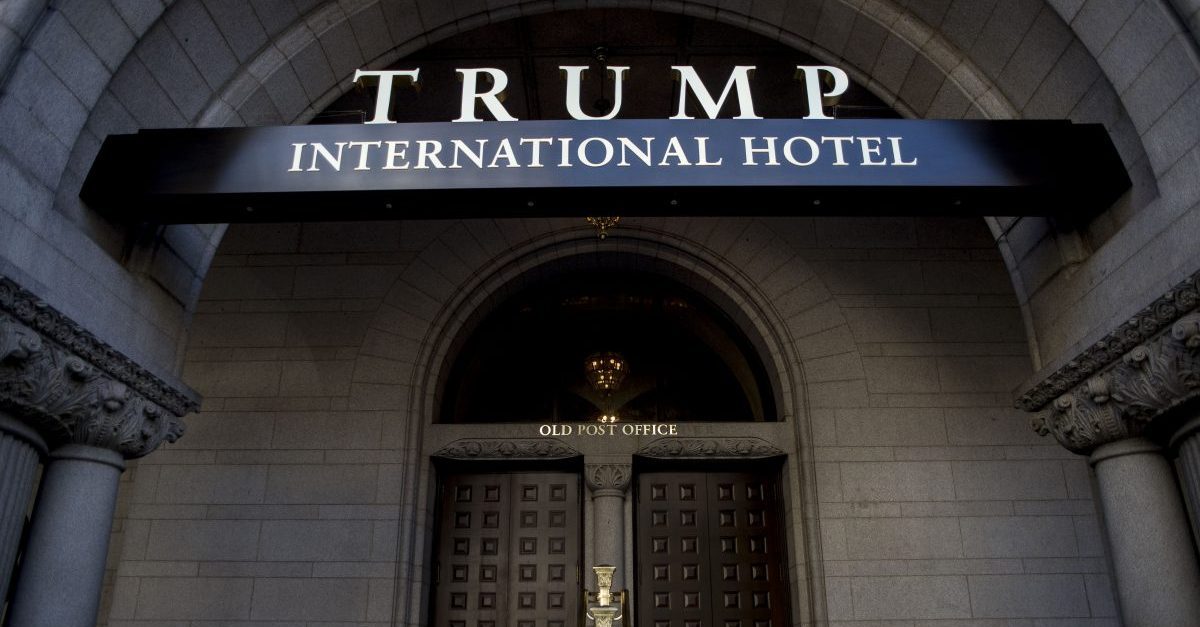
The General Services Administration’s (GSA) Office of Inspector General (OIG) on Wednesday said the Trump administration improperly disregarded the U.S. Constitution’s Emoluments Clauses when the agency considered whether President Donald Trump‘s lease on the Old Post Office Building–the current site of Trump International Hotel Washington, D.C.–was legally permissible.
The GSA OIG’s 49-page report concludes:
GSA recognized that the President’s business interest in the OPO lease raised issues under the Constitution’s Emoluments Clauses that might cause a breach of the lease; however, GSA decided not to address those issues in connection with the management of the lease. We also found that the decision to exclude the emoluments issues from GSA’s consideration of the lease was improper because GSA, like all government agencies, has an obligation to uphold and enforce the Constitution; and because the lease, itself, requires that consideration.
At issue here are two sections of the U.S. Constitution: (1) the Title of Nobility Clause located at Article I, Section 9, Clause 8; and the Presidential Emoluments Clause located at Article II, Section 1, Clause 7–collectively and colloquially known as the Emoluments Clauses. Essentially, these clauses have been interpreted to mean that U.S. presidents cannot receive excessive remuneration from either foreign or domestic sources during their tenure as president if such money is paid as a result of being president.
But according to Inspector General Carol F. Ochoa, the GSA’s general counsel simply ignored those constitutional issues when making their decision about Trump’s lease after he was elected president.
[GSA] attorneys recalled participating in a few internal discussions about the emoluments issues after the election, the report notes. Most attorneys on the OPO project were aware that there was a Foreign Emoluments Clause and a Presidential Emoluments Clause. One attorney stated his view at the time was that the purpose of the Presidential Emoluments Clause was to prevent a President from receiving additional compensation beyond his salary for performing his job as an elected official and that the clause did not apply to income from pre-existing business arrangements. Another attorney thought that there were good arguments to be made on both sides of the issues presented by the two Emoluments Clauses. In the end, they all agreed early on that there was a possible violation of the Constitution’s Emoluments Clauses. Nonetheless, the attorneys decided to ignore the emoluments issues.
But when Ochoa’s team pressed the GSA about foreign emoluments issues, the agency’s deputy general counsel said that such issues were occasionally addressed–for lower level employees.
“When asked whether GSA addresses emoluments issues in other contexts, [attorney Lennard S.] Loewentritt acknowledged that issues under the Foreign Emoluments Clause occasionally arise in connection with foreign gifts and travel paid by foreign governments for GSA employees,” the report continues, “but said that [GSA’s general counsel] does not get involved with supplemental income emoluments. He told us those issues were for the Department of Justice’s Office of Legal Counsel (OLC) or the Office of Government Ethics (OGE).”
A tertiary issue explored in the GSA OIG’s report is Section 37.19 of the GSA lease on the Old Post Office Building.
That provision notes:
No member or delegate to Congress, or elected official of the Government of the United States or the Government of the District of Columbia, shall be admitted to any share or part of this Lease, or to any benefit that may arise therefrom; provided, however, that this provision shall not be construed as extending to any Person who may be a shareholder or other beneficial owner of any publicly held corporation or other entity, if this Lease is for the general benefit of such corporation or other entity.
The GSA OIG’s report also says that the agency’s failure to properly look into the Constitutional issues viz. the Emoluments Clauses resulted in an inadequate resolution of similar issues concerning the above-quoted section of the GSA’s Old Post Office Building lease.
“GSA’s unwillingness to address the constitutional issues affected its analysis of Section 37.19 of the lease that led to GSA’s conclusion that Tenant’s business structure satisfied the terms and conditions of the lease,” the report concluded. “As a result…the uncertainty over the lease remains unresolved.”
[image via Gabriella Demczuk/Getty Images]